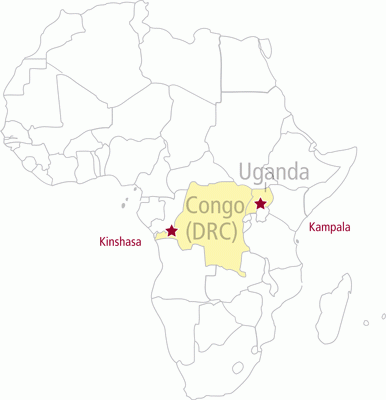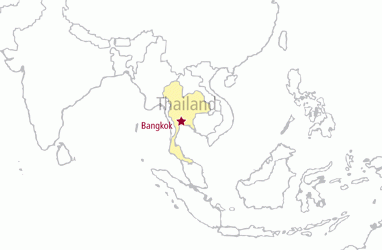The RESPOND project was a 2009-2014 cooperative agreement funded by the U.S. Agency for International Development as part of the Emerging Pandemic Threats Program.
The objective of RESPOND was to improve the capacity to respond to zoonotic and emerging infectious diseases around the world. RESPOND utilized a One Health approach that involved multi-disciplinary teams from the University of Minnesota and partner organizations. The University of Minnesota now leads a new cooperative agreement with USAID called the One Health Workforce project which builds on the work of the RESPOND project and focuses on creating a global workforce that is prepared to predict, detect, and respond to infectious disease outbreaks.
In 2009, the U.S. Agency for International Development (USAID) awarded the University of Minnesota a five-year cooperative agreement for the RESPOND project, largely because of Minnesota's demonstrated ability to address global disease challenges through collaboration across health disciplines and academic, government, and private sectors. A team from the College of Veterinary Medicine (CVM), School of Nursing, School of Public Health (SPH), and Medical School had a lead role in USAID's Emerging Pandemic Threats RESPOND project, building One Health capacity in emerging disease hotspots around the globe. Efforts were focused on developing One Health university networks in Africa and Southeast Asia by bringing together schools of veterinary medicine, public health, nursing, and human medicine from different universities to address complex challenges like emerging diseases in human and animal populations.
As One Health networks were developed, other strengths were also being shared: faculty experience and expertise in collaborating across health disciplines, schools, and universities, as well as linking university service to government and private sectors. Benefits to the University included partnerships with individual faculty, schools, and universities to address global health challenges.
Together, these collaborative efforts focused on the development of One Health demonstration sites, training in risk analysis and experiential learning approaches, integrating disease surveillance across human and animal populations, synergizing One Health core competencies, developing One Health leadership skills, and more, with an eye toward long-term sustainable partnerships between universities and across countries.
DAI, a development company based in Washington DC, lead the project and Tufts University was an additional collaborator. Other projects in USAID’s Emerging Pandemic Threats Program included PREDICT, IDENTIFY, PREPARE and PREVENT.
The University of Minnesota now leads a new cooperative agreement with USAID called the One Health Workforce project which builds on the work of the RESPOND project and focuses on creating a global workforce that is prepared to predict, detect, and respond to infectious disease outbreaks.
Congo Basin

RESPOND supported two offices in the Congo Basin, in Kinsasha, Democratic Republic of the Congo and in Kampala, Uganda. The central offices were meant to be the hub of a wheel, with the spokes representing the involvement of nearby countries.
One University of Minnesota RESPOND activity conducted in this region was the Global Health Institute held August 1-13, 2010 at Makerere University in Kampala, Uganda. 12 students from the University of Minnesota and 65 students from 7 countries in central and eastern Africa participated in this course which focused on a One Health approach to infectious disease. The students were able to interact with other students and instructors from multiple disciplines including nursing, medicine, veterinary medicine, and public health. University of Minnesota faculty from the School of Public Health, the School of Nursing and the College of Veterinary Medicine participated in the course.
In addition, the University of Minnesota participated in the newly formed One Health Central Eastern Africa (OHCEA) which is a network comprised of fourteen Public Health and Veterinary Higher Education Institutions in central and eastern Africa. The network now has 8 countries and is supported by the USAID One Health Workforce project at the University of Minnesota and Tufts University.
Southeast Asia

Currently RESPOND has an office in Bangkok, Thailand. A Global Health Institute along with other activities are planned in this area.
Faculty & staff
Co-Leads
John Deen
Professor
College of Veterinary Medicine
Katey Pelican
Assistant Professor
College of Veterinary Medicine
Faculty
Carolyn Garcia
Associate Professor
School of Nursing
Debra Olson
Associate Dean
School of Public Health
Linda Olson Keller
Clinical Associate Professor
School of Nursing
Cheryl Robertson
Associate Professor
School of Nursing
Dominic Travis
Associate Professor
College of Veterinary Medicine
Staff
Chris Dillon
Financial Analyst
College of Veterinary Medicine
Mac Farnham
Long-term Technical Advisor
College of Veterinary Medicine
Ann Fitzpatrick
Research Associate
College of Veterinary Medicine
Karin Hamilton
Analyst/Ecosystem Health
College of Veterinary Medicine
Michael Mahero
Analyst/Ecosystem Health
College of Veterinary Medicine
Serge Nzietchueng
Development Liaison
College of Veterinary Medicine
Jane Pederson
Executive Office and Administrative Specialist
College of Veterinary Medicine
Amy Pekol
Research Assistant
Organizational Leadership, Policy and Development
Innocent Rwego
Long term Technical Advisor
College of Veterinary Medicine
One health concept
The term “One Health” represents a concept of the inextricable link between human, animal and environmental health.
This concept is not new. The interdependence of human and animal medicine was espoused as “One Medicine” by physician pathologists Virchow and Osler in the 19th century. The term currently has different meanings for different people.
In 2008, the One Health Initiative defined One Health as “the collaborative effort of multiple disciplines working locally, nationally and globally to attain optimal health for people, animals, and our environment.” The One Health Initiative initially supported by the American Medical Association and the American Veterinary Medical Association, now lists over 40 supporting organizations on its website.
“One World – One Health” was coined by the Wildlife Conservation Society and in 2004, The Manhattan Principles were the result of an interdisciplinary symposium addressing the relationships between human, domestic animal and wildlife health. The Manhattan Principles are 12 recommendations that focus on the prevention of zoonotic disease and the maintenance of biodiversity.